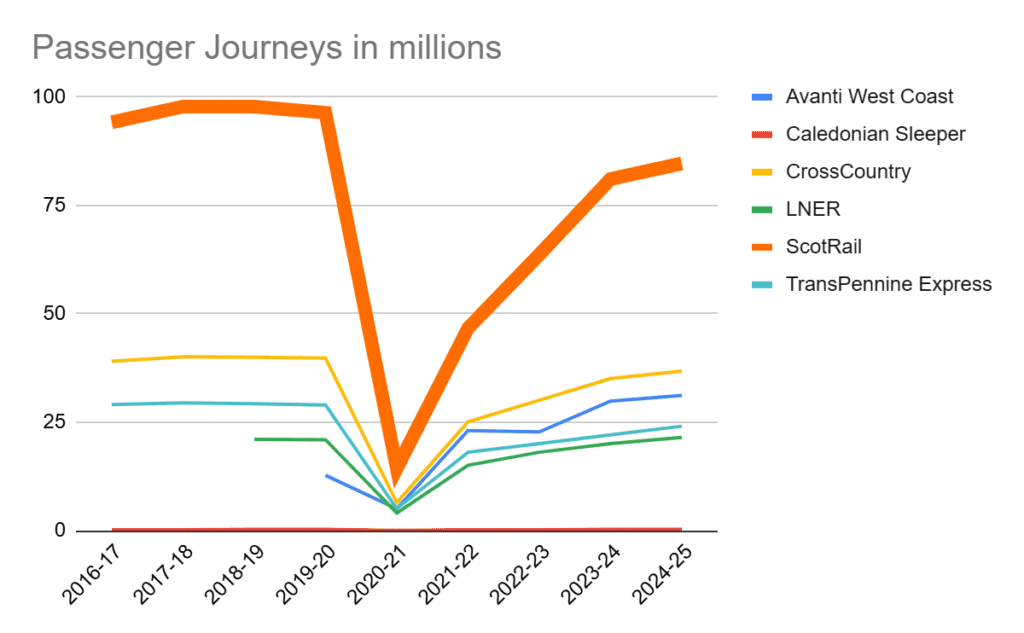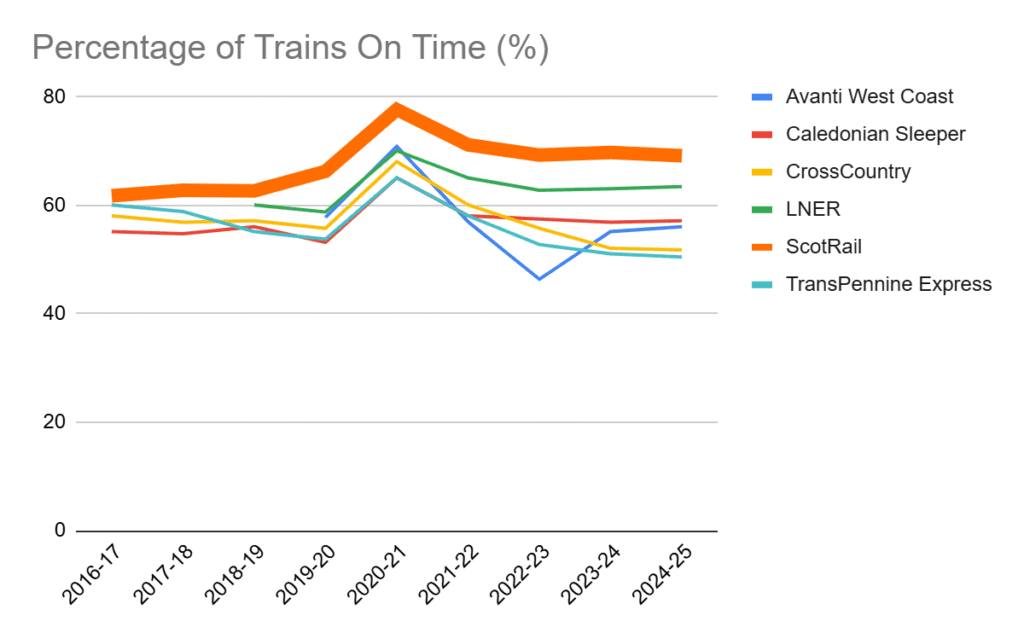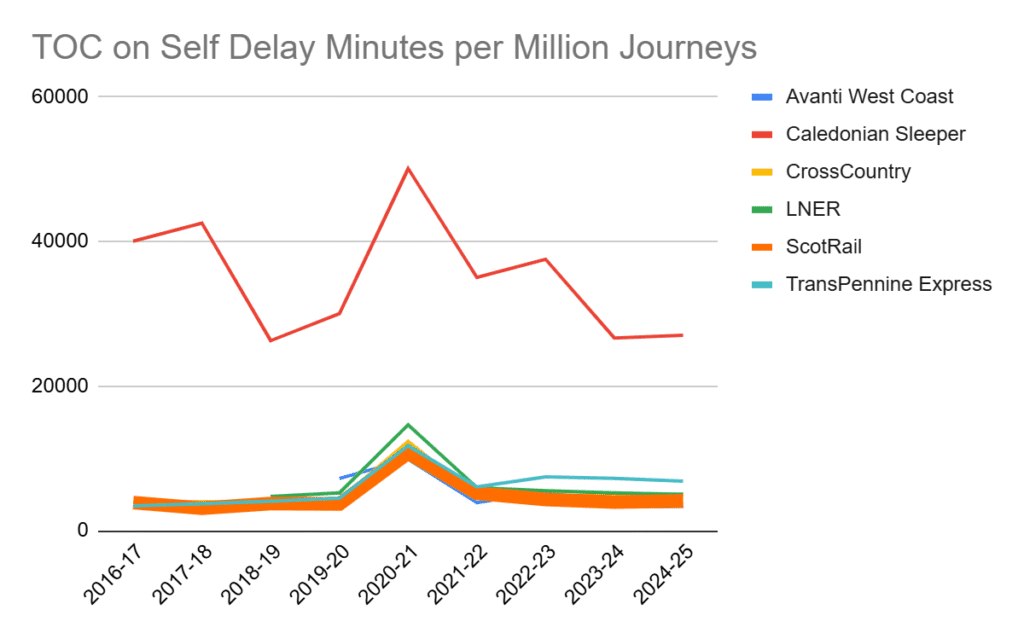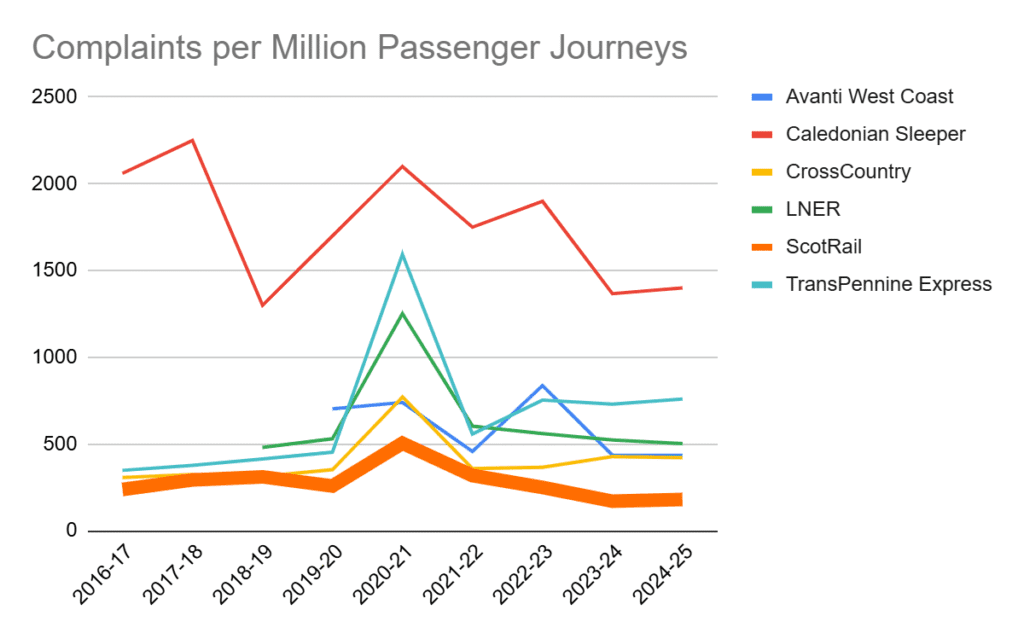On Monday 1st September 2025, ScotRail permanently abolished its peak fares, a UK-first move that means passengers now pay the same price at any time of day. However, this has faced intense scrutiny from across the political spectrum, raising more questions about the success of SNP transport policy, and their nationalisation of ScotRail in 2022.
Thursday 4th September 2025 saw ScotRail play a major role in the Scottish Parliament. The recent abolition of peak fares and the railway’s performance since its 2022 nationalisation were debated extensively during both the First Minister’s Questions and a members’ business debate led by SNP MSP Bob Doris.
If viewed from the SNP narrative, the scrapping of peak fares can be seen as a key benefit of having ScotRail in public ownership, allowing the railway to be run for the nation’s benefit rather than for private profit.
The SNP has strategically used its transport policy to bolster the case for Scottish independence. First Minister John Swinney hailed the nationalisation of ScotRail and the abolition of peak fares as key examples of a Scottish government delivering for its people. This narrative frames the policies as uniquely Scottish solutions that demonstrate the benefits of devolved governance, contrasting with the approach taken in the rest of the UK.
The SNP had also cited the importance of railway as a crucial tool for tackling the climate emergency by encouraging a long-term shift from cars to more sustainable train travel, and argued it directly helps constituents with the cost-of-living crisis by making travel more accessible and significantly cheaper.
Scottish Conservatives View:
However, the Conservatives have accused the SNP of a hypocritical and shameless “U-turn” on the issue of peak fares, and continued their criticism of nationalisation of ScotRail as a solution.
During a members’ business debate, Sue Webber MSP, Scottish Conservative transport spokesperson, forcefully argued that the SNP had made the “disastrous decision” to reintroduce peak fares last year following the end of the pilot scheme.
Webber stated that the SNP was trying to take credit for a policy they were effectively forced into adopting, and they had originally fought against the Conservative’s motion to keep them scrapped.
While welcoming cheaper fares, the Conservatives have argued the policy doesn’t fix the underlying problems with ScotRail under public ownership, and that things are “manifestly worse than they were under Abellio”. Webber described ScotRail as unreliable, with frequent cancellations and underinvestment, and that some passengers (e.g. Club 50 railcards) still face time restrictions for discounts, meaning the policy isn’t as universal as claimed.
Scottish Labour View:
Labour had welcomed nationalisation and the peak fare scrap, but framed it as a victory for their long-standing campaign for trade unions, heavily criticising the SNP handling of the issue. During the debate, Richard Leonard MSB of Scottish Labour and convener of the RMT union, rejected the SNP narrative of government success, seeing any progression as a union victory. Leonard stressed that removing peak fares (which they called a “tax on workers”) was a key demand of rail unions like the RMT, and condemned the SNP for scrapping the initial pilot,
arguing that reintroducing peak fares for the past year had needlessly hurt workers financially.
Labour also joined the Conservatives in criticising the SNP U-turn, quoting the SNP Transport Secretary’s previous justifications for ending the pilot (that it “didn’t achieve its goals” and “mainly benefited wealthier passengers”).
Scottish Greens View:
The Scottish Greens celebrated the abolition of the unfair “tax on workers”, with Mark Ruskell MSP framing it as a successful policy they had championed and helped secure since initiating the original pilot scheme.
Success of Nationalisation
To move beyond these conflicting political narratives, an analysis of key performance data is therefore essential to objectively measure the true impact of ScotRail’s nationalisation since 2022.
Utilising the Train Operating Company (TOC) key statistics from the Office of Rail and Road on the seven TOCs with significant service in Scotland, ScotRail’s performance both post-nationalisation and post-Covid can be assessed.
Number of Passenger Journeys:

The first area to inspect is the number of passenger journeys. On the graph above, ScotRail’s dominance is clear, approaching 100 million passenger journeys pre-Covid. While this can be explained as ScotRail often holds a monopoly over rural stations, the more interesting piece of information is that despite ScotRail failing to match its pre-Covid numbers, so are the other TOCs.
When inspecting the trends of growth post-Covid, ScotRail is outperforming other TOCs in terms of returning to their pre-Covid numbers. Post-nationalisation in 2022, passenger growth rates
were maintained, continue to outperform other TOCs.
This implies that ScotRail’s nationalisation cannot be written off as “worse than under Abellio” as Webber had claimed.
Service Reliability and Punctuality

A primary goal of nationalisation was to improve the quality of service for passengers. In surveys by the independent watchdog Transport Focus, customers consistently rank reliability and punctuality as the number one factor to improve train journeys. Anecdotally, I agree; there is no worse feeling than a late train that feels like it already cost £1 million.
As shown in the graph above, ScotRail continues to outperform rival TOCs in terms of percentage of trains on time, with post-Covid numbers outperforming that of pre-Covid.
In terms of post-nationalisation, the government has maintained its dominant performance in percentage of trains on time, once again indicating success.

When assessing the performance of TOCs in terms of delays, the best metric is the number of delay minutes from the TOC on itself. This excludes issues with National Rail or other TOCs that may delay passengers, and solely focuses upon the performance of individual TOCs.
A comparison of the number of delay minutes indicates that ScotRail once again matches the trends set by other TOCs, and even outperforms them with a lower increase in delay minutes per million journeys. This supports the SNP narrative of success.
Interestingly, the outlying TOC and worse performer is Caledonian Sleeper, another TOC operated by the Scottish government. However, considering nationalisation occurred when Serco’s contract ended and was not renewed in 2023, recent downward trends implies a nationalised Caledonian Sleeper is performing better post-Nationalisation.
Passenger Experience and Accessibility

A final area of comparison involves the number of customer complaints per million passenger journeys. The trend in the number of complaints provides insight into passenger satisfaction. While a very high number can be negative, a downward trend in complaints post-nationalisation would suggest a better passenger experience.
When inspecting Complaints Closed per million journeys, it is clear that ScotRail’s nationalisation has not worsened the service. During Abellio’s management, ScotRail maintained low numbers of complaints. Post-nationalisation, the number of complaints continued to drop, bucking the trend faced by other TOCs post-Covid in which complaints rose.
Overview:
The recent debate over the abolition of peak fares highlights a deep political divide, positioned within the wider narrative over the success of ScotRail’s nationalisation. While the SNP champions it as a victory for public ownership, the Conservatives decry the service as a failure, and both Labour and the Greens claim the policy as their own hard-won victory.
Beyond the political rigmarole, objective performance data showcases that a nationalised ScotRail is demonstrably outperforming its private-sector counterparts. It is leading the way in post-pandemic passenger recovery, maintaining superior levels of punctuality, and achieving a continuous decline in customer complaints at a time when other operators are seeing them rise.
Ultimately, the data cuts through the political noise, revealing a nationalised service that is performing well.
